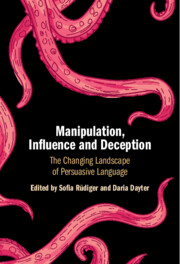Book contents
- Manipulation, Influence and Deception
- Manipulation, Influence and Deception
- Copyright page
- Contents
- Figures
- Tables
- Contributors
- I (Re)framing Persuasion
- II Persuasion and (New) Contexts of Use
- III The Dark Side of Persuasion
- 8 The Importance of Context in Analysing the Incitement of Violence
- 9 ‘I’d Say That Being Here Has Helped Me’
- 10 Language, Manipulation, and Online Radicalisation
- IV Persuasion and Algorithms
- V Discussion
- Index
- References
10 - Language, Manipulation, and Online Radicalisation
Weaponising Discourses of Masculinity on r/The_Donald
from III - The Dark Side of Persuasion
Published online by Cambridge University Press: 10 June 2025
- Manipulation, Influence and Deception
- Manipulation, Influence and Deception
- Copyright page
- Contents
- Figures
- Tables
- Contributors
- I (Re)framing Persuasion
- II Persuasion and (New) Contexts of Use
- III The Dark Side of Persuasion
- 8 The Importance of Context in Analysing the Incitement of Violence
- 9 ‘I’d Say That Being Here Has Helped Me’
- 10 Language, Manipulation, and Online Radicalisation
- IV Persuasion and Algorithms
- V Discussion
- Index
- References
Summary
While a great deal of research has examined the form and format of extremist content and the expressions of hate speech that exist within far-right online communities, there has been less attention on why young men, the primary target audience, become motivated to engage with this kind of material. As a corollary, what is also missing from most accounts of radicalisation is a sustained discussion of how discourses of masculinity are leveraged in extremist spaces and how these discourses become part of an overarching system of persuasion, manipulation, and, ultimately, recruitment to extremist organisations. This chapter offers an analysis of data collected from r/The_Donald to examine how discourses of masculinity are exploited as a means of promoting and normalising extremist positions within the community. The chapter also shows how these discourses of masculinity are bound up with race and ethnicity, where particular raced and gendered configurations become valorised as ideal, normative, and desirable. Taking all of this together, I argue that closer attention to the nature of these gendered discourses can help us develop more effective interventions around deradicalization, as well as better informing public education campaigns, particularly those aimed at young men.
Information
- Type
- Chapter
- Information
- Manipulation, Influence and DeceptionThe Changing Landscape of Persuasive Language, pp. 196 - 220Publisher: Cambridge University PressPrint publication year: 2025
References
Accessibility standard: Inaccessible, or known limited accessibility
Why this information is here
This section outlines the accessibility features of this content - including support for screen readers, full keyboard navigation and high-contrast display options. This may not be relevant for you.Accessibility Information
Content Navigation
Allows you to navigate directly to chapters, sections, or non‐text items through a linked table of contents, reducing the need for extensive scrolling.
Provides an interactive index, letting you go straight to where a term or subject appears in the text without manual searching.
Reading Order & Textual Equivalents
You will encounter all content (including footnotes, captions, etc.) in a clear, sequential flow, making it easier to follow with assistive tools like screen readers.
Visual Accessibility
You will still understand key ideas or prompts without relying solely on colour, which is especially helpful if you have colour vision deficiencies.
You benefit from high‐contrast text, which improves legibility if you have low vision or if you are reading in less‐than‐ideal lighting conditions.
